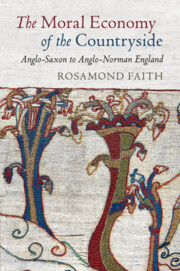Book contents
- Reviews
- The Moral Economy of the Countryside
- The Moral Economy of the Countryside
- Copyright page
- Contents
- Preface
- Abbreviations
- 1 Introduction: The Moral Economy
- Part I Rank
- Part II Reciprocity
- Part III Reputation and Witness
- Part IV The Wolf Sniffs the Wind
- Part V The Aftermath of Conquest
- Part VI In the World of the Manor
- 13 Establishing Custom
- 14 Thinking Feudally
- 15 From Rank to Class
- 16 Conclusion: Forward into the Past
- Appendix The Family Farm in Peasant Studies
- Bibliography
- Index
15 - From Rank to Class
from Part VI - In the World of the Manor
Published online by Cambridge University Press: 25 October 2019
- Reviews
- The Moral Economy of the Countryside
- The Moral Economy of the Countryside
- Copyright page
- Contents
- Preface
- Abbreviations
- 1 Introduction: The Moral Economy
- Part I Rank
- Part II Reciprocity
- Part III Reputation and Witness
- Part IV The Wolf Sniffs the Wind
- Part V The Aftermath of Conquest
- Part VI In the World of the Manor
- 13 Establishing Custom
- 14 Thinking Feudally
- 15 From Rank to Class
- 16 Conclusion: Forward into the Past
- Appendix The Family Farm in Peasant Studies
- Bibliography
- Index
Summary
This chapter suggests that while the landholding elite had developed a strong sense of itself as a distinct social group with interests in common, peasants were slower to do so. Part of the explanation for this may lie in the fact that there were some obvious distinctions between those who worked in exchange for holdings on manorial inlands and those with independent farms on the hidated land of the warland. Reasons why collective action employed in resistance to landlord demands took a long time to build in England at a time may have included Norman violence, or the threat of it. Pressure on peasants after the Conquest could well have taken some time to build up, as new lords took time to consolidate, let alone increase, what they expected their tenants to provide. Many peasants in the eleventh and early twelfth centuries would have had no reason to regard themselves as members of an inferior class: feudal tenure did not distinguish peasants from the rest of the free: it took the work of lawyers constructing the law of villeinage, case by case, to do that. Only when the manor became fully effective as an economic unit would peasants would become capable of acting as a ‘political’ community with a common interest.
- Type
- Chapter
- Information
- The Moral Economy of the CountrysideAnglo-Saxon to Anglo-Norman England, pp. 197 - 209Publisher: Cambridge University PressPrint publication year: 2019

